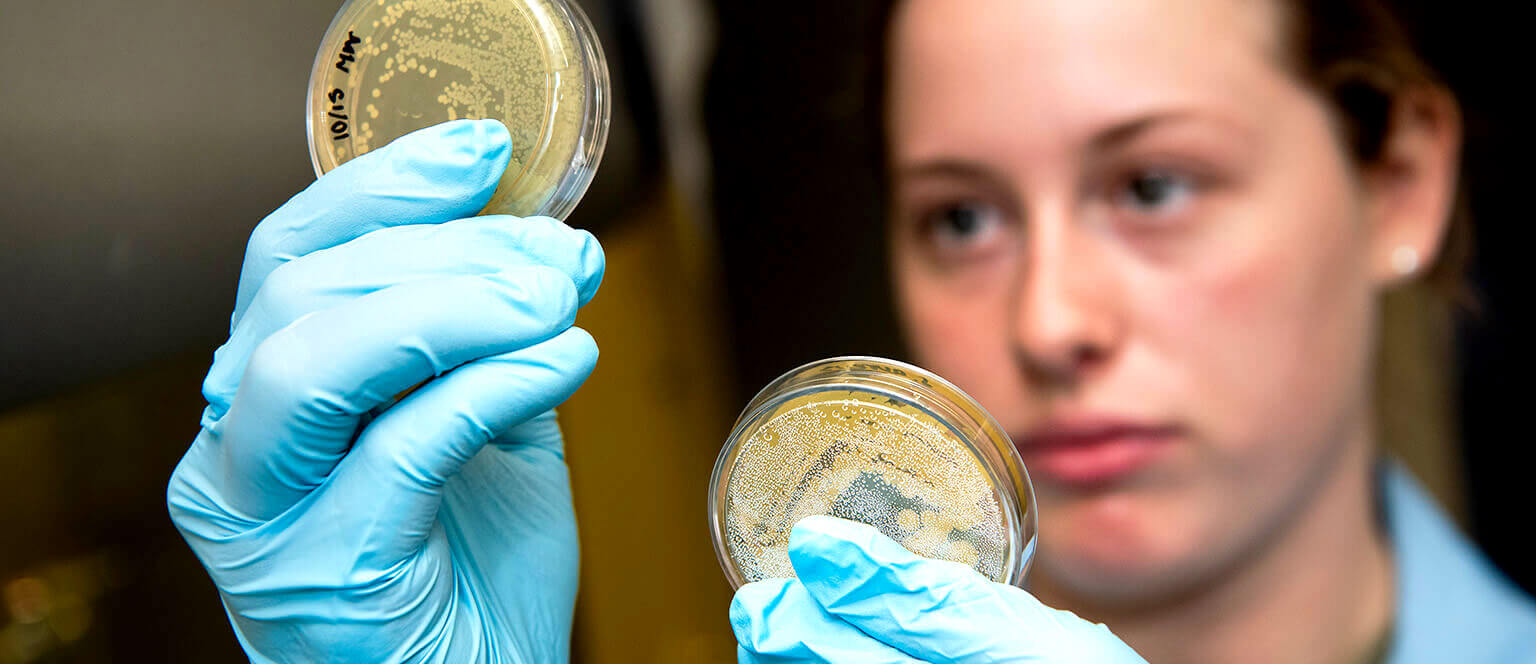BIOLOGY

The Biology major will prepare cadets to become Air Force officers skilled at critical thinking, grounded in the natural world, open to alternative perspectives, and capable of identifying solutions in complex environments.
The goal of the Biology major is to produce leaders who:
- are biologically literate
- use scientific thinking as a component of their decision-making process
- effectively communicate information to a wide variety of target audiences
- cultivate attitudes and values consistent with biological literacy
The Biology major offers an effective balance between required foundational courses and cadet-selected flexibility. In addition to the U.S. Air Force core curriculum, the Biology major comprises nine core courses (including organic chemistry), as well as Biology (3), Basic Sciences (1), and Academy (1) electives. The required courses represent and explore the spectrum of biological levels, from the molecules within cells to the organisms within ecosystems; the elective courses allow emphasis in environmental and organismal biology, cellular and molecular biology, and human biology. The strong biological foundation provided by these required courses, together with the flexibility and specialization provided by the electives, will allow cadets to tailor an academic program to meet their own interests, to pursue specialized areas of interest, or to prepare for advanced degrees/careers in the Air Force Medical Service (medicine, dentistry, nursing, physician assistant, aerospace physiology, bioenvironmental engineering, and physical therapy). Upon graduation, cadets can enter a wide variety of career fields in the Air Force.
The most effective approach to the Biology major involves some early intentional scheduling of Academy core courses. Cadets should enroll in chemistry 100 and chemistry 200 in their four-degree (freshman) year. Biology 215 is a prerequisite for the Biology majors’ courses, and should be taken by the fall semester of your three-degree (sophomore) year. However, if transferring from another major, cadets can still complete a Biology major in two years.
The Biology major is designed such that, by completion of our multi-disciplinary curriculum, our graduates shall demonstrate that they have attained the following student learning outcomes:
- an ability to apply a strong conceptual foundation of biological knowledge
- an ability to apply scientific and quantitative reasoning
- an ability to apply modeling and simulation
- an ability to operate within the multidisciplinary nature of science
- an ability to effectively interpret and communicate scientific information, including ethical and social controversies, to a targeted audience
- an ability to independently investigate and seek answers about the natural world (matter, energy, time, and their relationships)
- the development of a thoughtful perspective on the inherent value of the natural world and humanity’s relationship to it
POTENTIAL JOB ASSIGNMENTS
Within the Air Force
|
Outside the Air Force
|
SAMPLE COURSES
- Vertebrate Zoology
- Botany
- Genetics
- Anatomy and Physiology: Sensory and Motor Integration
- Principles of Evolution
SUGGESTED COURSE SEQUENCE
| 4-DEGREE (FRESHMAN) | 3-DEGREE (SOPHOMORE) | 2-DEGREE (JUNIOR) | FIRSTIE (SENIOR) |
|---|---|---|---|
| Beh Sci 110 Chem 100 Chem 200 Comp Sci 110 English 111 For Lang 1 For Lang 2 History 100 Math 141 Math 142 |
Biology 215 Biology 330 Biology 332 Chem 230 Econ 201 English 211 Engr Mech 220 Law 220 MSS 251 Physics 110 Pol Sci 211 |
Aero Engr 315 Biology 331 Biology 360 Biology 363 Biology 380 Biology Opt ECE 315 History 300 Math 356 Philos 310 Sci Breadth Opt STEM Option |
Academy Opt Astro Engr 310 Biology 459 Biology 480 Biology Opt Biology Opt Open Opt Sociocult Opt Soc Sci 311 |
DEGREE CONCENTRATIONS
Environmental and Organismal Biology Option
Combines the knowledge the physical world, the human element and problem-solving skills to understand man’s role and impact on the planet Earth
Bioenvironmental Engineering Option
Applies engineering and scientific knowledge and techniques to identify and manage risks for health protection; develop procedures, techniques and equipment; conduct and supervise engineering services; and participate in medical facility programs
Cellular and Molecular Biology Option
Combines the study of biochemical and cellular-level processes to understand the rapidly growing fields of genetic engineering, immunology, disease defense, hormonal control, aging and cancer
Human Factors and Performance Option
Allows cadets to study the physical, physiological, mechanical and psychological factors related to the man-machine interface (human factors) or to optimizing and teaching neuromuscular skills (performance, athletics)
Aerospace Physiology Option
Studies the management of aerospace physiological training and hyperbaric therapy units, performance of research and provision of expertise on the human aspects of manned high-altitude/high-speed flight (including space flight)
Physical Therapy Option
Prepares cadets to provide professional care that can be applied to patients referred from most disciplines of medicine
Professional or Advanced Degree Option
Designed for cadets pursuing graduate school or a professional health degree.
VALIDATION AND TRANSFER CREDITS
We accept AP credit toward Bio 215 (Introductory Biology with Laboratory) for sufficiently high scores on the AP Biology exam. The transfer of credits for equivalent courses is handled on a case-by-case basis and must be approved by the department head and the Biology 215 course director.
CONTACT US
Colonel Steven Hasstedt
Department Head
steven.hasstedt@afacademy.af.edu
(719) 333-2720